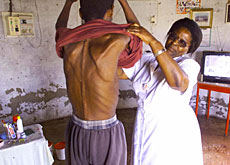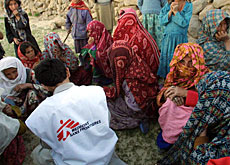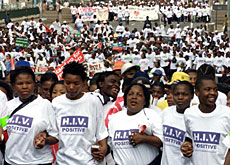New drug research initiative launched in Geneva

Millions of poor people worldwide die every year from so-called neglected diseases for which no treatment is available.
Now, a new research body has been created in Geneva to develop drugs and other health tools for people suffering from illnesses that have been largely ignored by the drug companies.
The aim of the Drugs for Neglected Diseases Initiative (DNDi) is to tackle killer illnesses, such as sleeping sickness and Chagas disease, that occur mainly in impoverished nations.
“The people touched by these illnesses are usually very poor, with no buying power, which means that neither public research nor private industry are paying any attention to the subject,” the organisation’s chairman, Yves Champey, told swissinfo.
Lack of interest
But the outgoing director general of the Geneva-based World Health Organization, Gro Harlem Bruntland, says industrialised nations can no longer afford to ignore rural and remote populations – or the problems that plague them.
“Rich countries should not be fooled into thinking they live in a health sanctuary,” Bruntland told swissinfo.
“Globalisation has shrunk distances, broken down all barriers and linked people together… and it has made problems halfway around the world everyone’s problem,” she added.
Over the next 12 years, DNDi plans to spend $250 million (SFr340 million) on creating new medicines to fight the world’s most neglected diseases.
Champey draws a distinction between illnesses such malaria and tuberculosis – which have a small market for drugs because wealthy countries are minimally affected by them – and diseases like Leishmaniasis, which is rife in rural areas of the Indian subcontinent.
“Clearly, rich countries have not taken any notice of those diseases, which are more limited in scope and touch very poor areas, because they are not affected by them.”
Most neglected
Spread by sand flies, Leishmaniasis attacks its victim’s immune system and can cause severe facial deformities.
Other examples of ignored illnesses include Chagas disease, which is found in South America, and is caused by a blood-sucking bug that slowly eats away at the internal organs.
Sleeping sickness, which is transmitted by the tsetse fly, has made a massive comeback in sub-Saharan Africa and left untreated can be fatal.
Together, these illnesses threaten 350 million people, but Champey also points out that existing therapies are often painful or toxic – and decades old.
“The pharmaceutical industry has only recently started looking at tuberculosis and malaria… and this is the only effort that can be identified in the past 25 years,” said Champey.
“The drugs which are used are old, difficult to administer, take a long time to work and have terrible side effects… resistance has also appeared, so we need new drugs to address these issues,” he added.
Pharmaceutical industry
DNDi will link the aid agency, Médecins Sans Frontières, with public health bodies from developing countries, as well as the WHO, in a bid to plug the gap between research and illness.
“For health, Geneva is the best location because this is where we have the best chance to meet with delegates from developing countries on a regular basis,” said Champey.
But the success of the initiative will depend largely on the willingness of the pharmaceutical and biotech industries to devote more resources and money to neglected diseases research.
The DNDi has accused the pharmaceutical sector of being preoccupied by profit-making treatments for “lifestyle diseases” such as baldness, impotence and jet lag.
But Champey hopes Swiss-based pharmaceutical companies, like Novartis and Roche, will take on an active role in lending their expertise and facilities to the new project.
“They’ve promised help once we have outlined well-defined projects… and I hope we’re going to receive it,” said Champey.
“The answer is simple but achieving it will be extremely difficult,” he added.
swissinfo, Anna Nelson in Geneva
The Drugs for Neglected Diseases Initiative (DNDi) links the charity, Médecins Sans Frontières, with public health bodies from developing countries.
Its aim is to plug a gaping hole between public and private drugs research and global illness.
According to the Geneva-based organisation, “a mere ten per cent of the world’s health research efforts go into diseases that account for 90 per cent of the global disease burden”.
Neglected diseases include sleeping sickness, Chagas disease and Leishmaniasis, which threaten the lives of 350 million of the world’s poorest people.

In compliance with the JTI standards
More: SWI swissinfo.ch certified by the Journalism Trust Initiative


You can find an overview of ongoing debates with our journalists here. Please join us!
If you want to start a conversation about a topic raised in this article or want to report factual errors, email us at english@swissinfo.ch.